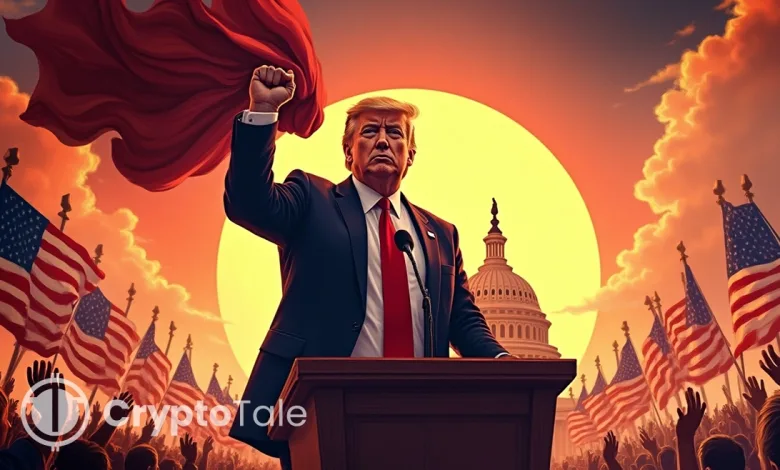Trump’s “One Big Beautiful Bill” Sparks Clash Over Crypto, Rates, and Subsidies

- Trump’s budget bill includes crypto tax reforms, interest rate demands, and subsidy threats.
- Senator Lummis proposes tax-free crypto transactions under $300 and fairer rules for miners.
- Trump pressures the Fed for 1% interest rates while attacking Musk over government subsidies.
President Donald Trump’s push for his “One Big Beautiful Bill” has sparked intense political and economic debate in Washington. The sweeping budget proposal ties together tax reform, crypto regulation, and interest rate cuts. It also threatens funding for major companies, including those led by Elon Musk.
On Monday, Senator Cynthia Lummis proposed adding a major crypto tax amendment to the bill. Her amendment would waive taxes on small crypto transactions under $300. It would also fix how staking and mining rewards are taxed.
Currently, crypto users face taxes when they receive block rewards and again when they sell them. Lummis’ amendment aims to fix this double taxation. It would ensure miners and stakers pay tax only when they sell their rewards.
Crypto advocates say the policy would reduce confusion and encourage adoption. The plan would also allow up to $5,000 in annual tax-free crypto transactions. This measure could ease entry for everyday users.
Lummis also included language to address crypto lending, wash sales, and donations. These reforms have drawn strong support from crypto firms, many of which have urged Congress to back the plan. The amendment has not yet gone to a vote. However, it is now a central part of Trump’s broader economic agenda.
Trump Demands Rate Cuts, Slams Elon Musk
As Congress debates the bill, Trump continues targeting the Federal Reserve. On Monday, he again demanded ultra-low interest rates. He said the U.S. should be paying 1% or less in borrowing costs. Trump shared a handwritten note on Truth Social featuring a global central bank interest rate chart, comparing the U.S. rate at 4.25–4.50% to much lower rates in countries like Switzerland and Japan. He criticized Fed Chair Jerome Powell for “costing the USA a fortune.”
Trump also sent the chart to the Federal Reserve Board, according to White House officials. He wrote that the Board “should be ashamed of themselves” for allowing high rates. The attack follows months of criticism from Trump toward Powell and other Fed leaders.
He appointed Powell in 2018 but has since called him a “fool” and “numbskull.” He blames Powell for high interest payments on U.S. debt. Press Secretary Karoline Leavitt said the American people want cheaper borrowing costs. She added that high rates continue to burden the economy.
Alongside monetary policy, Trump also took aim at Elon Musk. In another social media post, he accused Musk of relying heavily on government support. Trump claimed Musk’s companies have received more subsidies than any person in history.
He warned that if the government cuts funding, Musk’s businesses might collapse. Trump mentioned space launches, electric vehicles, and satellites as areas that depend on subsidies. He joked that perhaps DOGE should investigate Musk’s finances.
The post came days after Musk voiced concern over parts of Trump’s bill. Musk has previously supported deregulation but criticized specific budget priorities.
Related: Trump’s Rate Cut Battle with Powell: Will His Fed Chair Pick Shift Policies?
Economy, Crypto, and Tech Policy Intersect
Trump’s budget proposal has become a lightning rod in Congress. It includes major tax cuts, border funding, and new job programs. However, its crypto, interest rate, and subsidy provisions are creating deeper divides.
Supporters argue that the crypto reforms will modernize outdated tax regulations. They believe that the reduction of interest rates would help in growth. Critics warn the bill risks economic imbalance and unnecessary political fights.
For now, the crypto amendment remains under debate. Lummis and her allies continue to push for inclusion before the final vote. Trump’s pressure on the Fed adds urgency to monetary discussions.
Meanwhile, Musk has not made any official reaction to Trump’s threats. Markets are closely watching the next moves from lawmakers, regulators, and tech leaders. As policy battles heat up, the outcome of the “Big Beautiful Bill” could reshape the U.S. financial and digital landscape.




